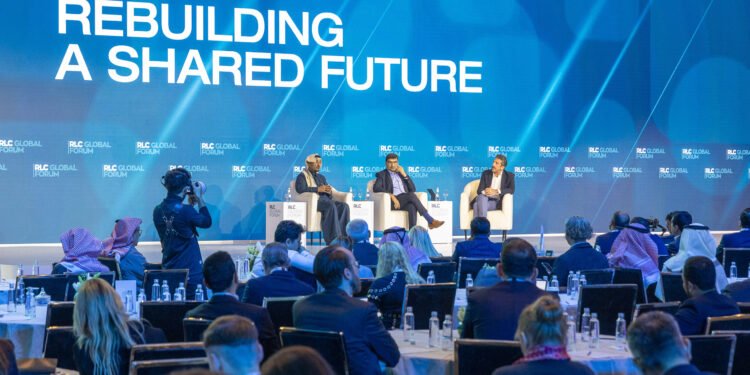The 2025 RLC Global Forum opened today in Riyadh under the theme “Rebuilding a Shared Future,” bringing together the most influential leaders from across the retail ecosystem. Held at the Fairmont Riyadh, the Forum set the stage for high-impact discussions on resilience, digital acceleration, AI-driven innovation, and strategic collaborations, uniting global CEOS, industry pioneers, investors and policymakers to address the challenges and explore solutions that will define the future of global retail.
The day kicked-off with high-impact discussions that tackled the most pressing issues shaping the future of retail. The “Business Outlook: Navigating A New Global Order” session examined the impact of geopolitical tensions, economic uncertainty, and rapid technological transformation on global commerce, with international business leaders exploring strategies for turning volatility into opportunity while driving resilience and innovation. Meanwhile, “A New Leadership Order: Building Growth in Turbulent Times” focused on the role of visionary leadership in overcoming economic headwinds, optimizing productivity, and fostering sustainable growth. Industry experts shared insights on navigating complex business ecosystems and leveraging strategic adaptability to thrive in an ever-evolving marketplace
Discussions also centered on the transformative power of social commerce, which is reshaping how consumers shop, interact and engage with brands. With e-commerce in the Middle East projected to reach USD 57 billion by 2026, the role of marketplaces in meeting evolving consumer expectations remains paramount. Statistics show that 80% of regional shoppers prefer online platforms for their convenience and variety, raising critical questions about how businesses can design consumer-centric marketplaces that cater to regional dynamics while maintaining global competitiveness.
In addition, Zia Daniell Wigder, Chief Content Officer at EMARKETER, showcased a specially drafted report in partnership with the RLC Global Forum. This session provided a data-driven roadmap for the future of e-commerce in the GCC, offering valuable insights into consumer trends, market dynamics, and strategic opportunities for sustainable growth in the region.
AI was another major highlight of the day, with multiple sessions delving into its transformative potential across the retail sector. Industry leaders explored how AI is being used to enhance personalization, optimize supply chains, and drive operational efficiencies at scale.
The Lifestyle Destinations Stage brought a fresh perspective to the convergence of retail, tourism, and urban development. Sessions focused on how retail-driven cities are evolving into vibrant lifestyle hubs, integrating entertainment, hospitality, and commerce to redefine consumer experiences. The conversations highlighted the growing role of mixed-use developments in shaping the future of retail spaces, emphasizing sustainability and cultural relevance as key factors in long-term success.
Complementing the main stages’ discussions, the day’s roundtables, provided an opportunity for deeper engagement on some of the industry’s most pressing topics such as the region’s shifting retail landscape, collaboration and strategic alliances fueling retail innovation, and how businesses can capitalize on emerging opportunities in an evolving global economy.
The day also saw significant commitments take shape, with key partners set to sign Memorandums of Understanding (MOUs) to drive future collaborations and industry advancements.
Building on the momentum of Day 1, participants eagerly look ahead to Day 2, where deep dives into omnichannel strategies, leadership evolution, and the future of luxury retail will take center stage.



